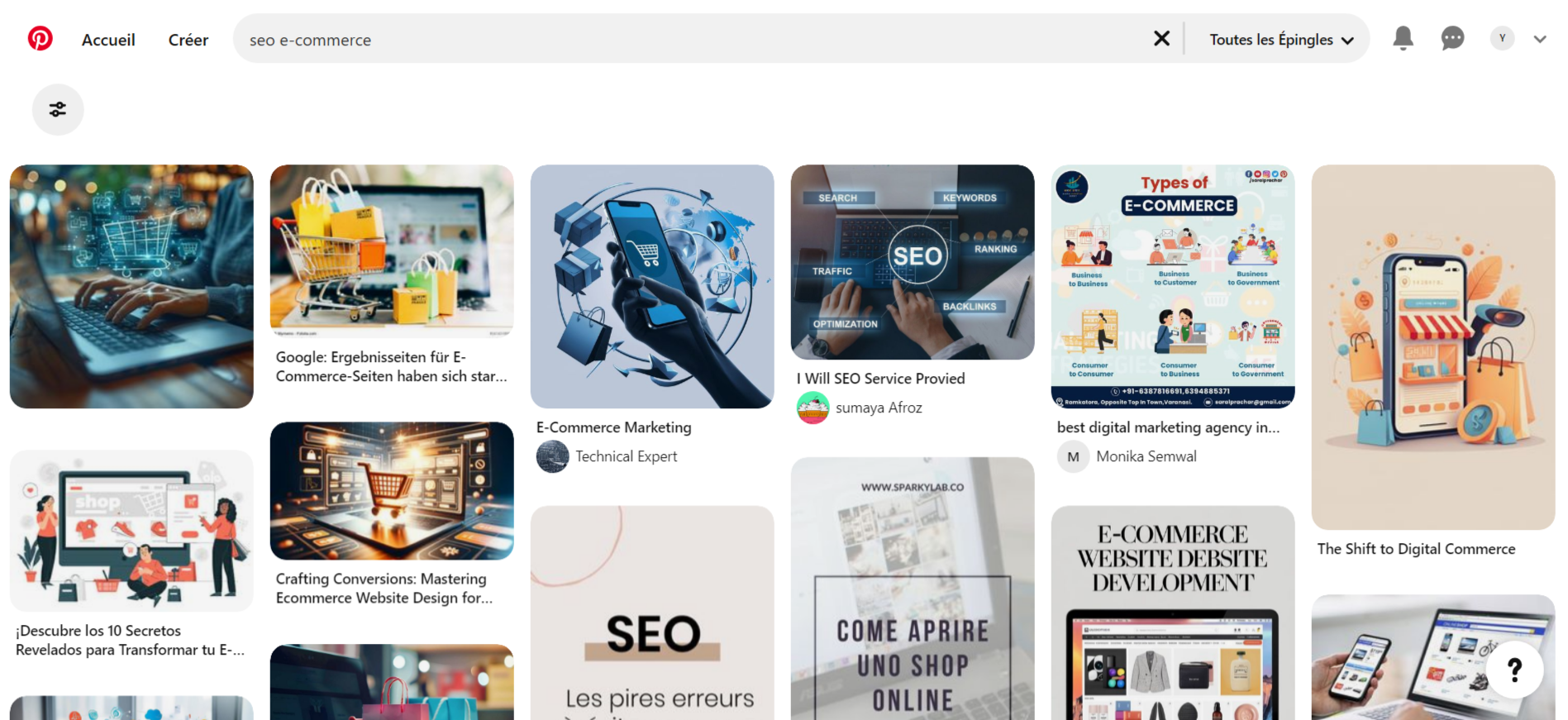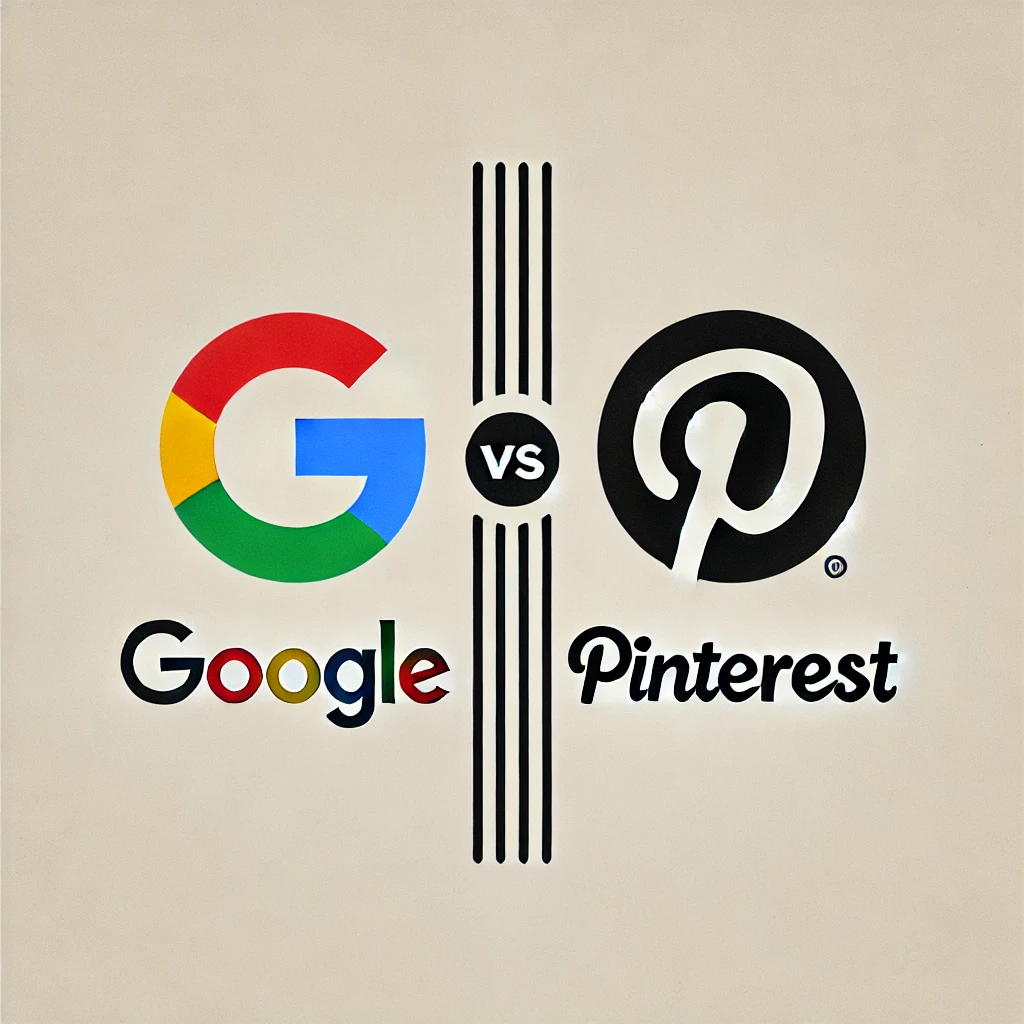Pinterest or Google: which platform is more effective for optimizing the visibility of your e-commerce? While Pinterest captivates with its visual and inspirational approach, Google remains the essential giant of transactional searches. Each platform has its strengths, but which one truly aligns with your goals? In this article, we will compare these two SEO strategies, analyzing their specifics, advantages, and limitations. Take a few minutes to discover which approach to adopt and how to maximize your traffic and conversion potential!
Pinterest SEO: A visual platform for inspiring commerce
Pinterest, often perceived as a social network, is actually a powerful visual search engine. Its unique approach allows e-commerce merchants to attract an audience seeking inspiration and new ideas. When used correctly, Pinterest SEO can become a major asset for generating qualified traffic.

How does SEO work on Pinterest?
SEO on Pinterest relies on several key elements:
- Pin optimization: Integrate relevant keywords into titles and descriptions. For example, for a decor shop, use “minimalist decor ideas.”
- Use of hashtags: Add hashtags related to your product or niche to improve searchability.
- Creation of attractive visual content: Clear, colorful, and engaging images increase the chances of clicks and shares.
Unlike other social networks, pins on Pinterest have a prolonged lifespan, capable of generating traffic months, even years, after their publication.
The benefits of SEO on Pinterest for e-commerce
Pinterest stands out due to its active and engaged audience:
- 89% of Pinterest users actively look for shopping ideas, according to Pinterest Business.
- Pins generate clicks for visual categories like fashion, decor, or cooking.
- The visual nature of the platform allows brands to showcase their products in an appealing context, thus increasing purchase intent.
Google SEO: An essential lever for transactional commerce
Google, the most used search engine in the world, remains an essential reference for any SEO strategy. Its ecosystem, focused on search intents, offers e-commerce merchants highly qualified traffic and unmatched conversion potential.

The fundamentals of SEO on Google
To maximize visibility on Google, it is crucial to work on several aspects:
- On-page optimization: Integrate strategic keywords into titles, meta tags, descriptions, and content. For example, for a site selling running shoes, target terms like “buy running shoes.”
- Backlinks: Obtain inbound links from reputable sites to strengthen your authority.
- Quality content: Provide articles, guides, or product descriptions that directly address users’ questions.
- Local SEO: Leverage Google My Business to appear in local searches, particularly useful for physical stores.
The benefits of SEO on Google for e-commerce
Google SEO excels at capturing an audience with explicit purchase intent. For example, a search like “best electric drill” indicates a clear intent to compare and buy. The advantages include:
- Access to a large global audience.
- Powerful tools like Google Analytics and Search Console to analyze traffic and adjust your strategies.
- Relevance for transactional and informational queries, addressing all stages of the purchasing journey.
Limits of Google SEO
However, Google SEO presents challenges:
- High competition: Transactional keywords are often dominated by major brands.
- Long-term results: It takes time and ongoing effort to achieve high rankings.
Pinterest SEO vs Google SEO: Strategic comparison
To choose between Pinterest SEO and Google SEO, it is essential to understand the fundamental differences between these two approaches and their impact on your e-commerce strategy.

User Objectives
User intents vary significantly from one platform to another:
- Pinterest: Users seek inspiration and ideas for future projects. For example, a user searching for “home decor ideas” will browse through pins for inspiration before making a purchase.
- Google: Searches are often more specific and transactional. A search like “buy wooden industrial shelf” reflects a clear intent to buy or compare.
Types of Suitable Content
Performance formats also differ:
- Pinterest: Focus on captivating visuals, infographics, or creative guides. For example, a clothing store can post seasonal outfits or outfit ideas.
- Google: Focus on detailed product descriptions, optimized blog articles, and explanatory videos. FAQ pages and comprehensive guides also enhance positioning.
ROI and Required Effort
- Pinterest: Quick engagement thanks to attractive visuals, but a more limited and niche audience.
- Google: Long-term results with high traffic potential, but requiring ongoing optimization efforts.
Which approach to choose for your e-commerce?
To determine whether Pinterest SEO or Google SEO is best suited for your e-commerce, it is essential to assess your goals, your products, and the habits of your audience.

Identify Your Goals
Your choice depends on marketing intents and the type of products you offer:
- Pinterest: Ideal for visual and inspiring products like fashion, decor, or DIY. For example, a store selling handmade jewelry can leverage pins to attract an audience looking for unique ideas.
- Google: Better suited for products with explicit or transactional demand, like electronics or sports equipment. A search like “buy Lenovo laptop” reflects a clear intent that Google can capture effectively.
Combine Pinterest and Google SEO for a winning strategy
Instead of choosing one platform, a hybrid strategy can maximize your results:
- Pinterest: Attract visitors at the top of the purchase funnel with captivating and inspiring visuals. For example, publish outfit ideas for winter, accompanied by a link to your site.
- Google: Convert these visitors into customers with pages optimized for specific keywords. Well-optimized product listings and detailed blog articles enhance credibility and conversion.
Pinterest SEO and Google SEO provide unique opportunities to achieve your e-commerce goals. While Pinterest captures attention through inspiration and visuals, Google transforms clear intents into conversions. By combining these two approaches, you can inspire, engage, and convert your visitors at every stage of the purchasing journey. To optimize your multichannel management, adopt tools like Sosoon, which facilitates the management of your Pinterest, TikTok, and X – Twitter accounts, multiplying your traffic opportunities. Take action and elevate your SEO strategy.




